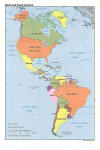| AMS 100: Introduction To American Identity and Culture |
I. American Studies
A. Americans: Names and Identity
The name American as a noun means a person that is native or an
inhabitant of America, but the most common reference is to the U.S.A., United
States of America. However, it can mean anyone from any country in the Americas:
North American, Meso America (including the Caribbean) and South America. Within all of the nations of the Americas born of European colonies that invaded
Native American nations are surviving Native American groups and a series of
various immigrants. Depending on the prejudicial barriers, economic necessity
and survival admixture took place that produced physical blending as well as new
cultural identities.
Within all of the nations of the Americas born of European colonies that invaded
Native American nations are surviving Native American groups and a series of
various immigrants. Depending on the prejudicial barriers, economic necessity
and survival admixture took place that produced physical blending as well as new
cultural identities.
Identity is both a subjective and an objective phenomena based on individual cognitive domains and outward behaviors, clothing, hair, body art and accessories. The perspective of the individual and others completes an identity of a person, group, region, nation, etc. Ones identity changes and evolves. Sometimes, the chasm between self conceived identity and how others see us can be great and scary. Many mixed identities can be very complex and confusing, but can be a sources of strength. Americans can be from a real mix of the following, with the possibility unknown or denied origins.
| American group names |
| Native American (Inuit, Yupik, Aleut. American Indian) |
| European American |
| African American |
| Asian American |
| Pacific Islander American These names are basic and current, but have changed over the years. Also, the social terms for these groups are loaded with prejudice and ignorance. Humans tend to respond to expressed difference in look, speech, behavior and perceived ideology. We can embrace or celebrate difference, as well as reject or persecute those that are different. American culture has gone through many cycles of moving away from homeostasis. |
B. Folk Culture and American Studies
American Studies is an interdisciplinary area that includes history, anthropology/sociology, literature, visual arts, music, ethnic studies and gender studies that focus on American culture over time to the present. Some scholars study just the United States, while others include all of the Americas. Attempts to document American culture, both Native American and Immigrant cultures (European, African, Asia-Pacific) really began with Thomas Jefferson and Albert Gallatin who set out to study Native American language and culture when Philadelphia was our nations capitol. Benjamin Franklin established the American Philosophical Society in 1743-45 to bring together knowledge of the early colonial experiment in America. Thomas Jefferson became the president of the American Philosophical Society in 1797 just before becoming Vice President of the United States. Jefferson used the APS as a think tank and resource to prepare for the "Voyage of Discovery"/ The Lewis and Clark Expedition 1803-06. The U.S capitol shifted to Washington D.C and later the Smithsonian Institution (established in 1846) became our nations 'attic' and sought to gather objects and information about American culture. Since a good deal of America's experience on the frontier necessitated knowledge and information to be informal, The American Folklore Society was established in 1888 to document and preserve oral traditions.
An American historian, Frederic Jackson Turner, wrote a paper in 1890 that promoted the idea that the 'frontier experience' in America was reflected in the literature and art with symbols or themes that revealed the uniqueness of an American Culture. The frontier symbolized the spiritual and economic renewal of the country and those that settled it. The 'virgin' land or wilderness confronted civilization and became the "Promised Land" with Manifest Destiny as the justification for European Christian immigrants to displace Native Americans, cut down forests and kill all the wildlife they could. These ideas were an effective driving force in American history, but distorted the complexity of the environment, ignored ethnic diversity, women, the fact the land was not free but stolen. As Americans closed the frontier in 1890 the discrepancies became clear and a progressive movement emerged. The progressive movement tried to protect what was being destroyed or abused. This is still a continual debate in American culture. We still struggle with what is an American? From an individual point of view this becomes part of one's identity that is ultimately shared to some degree to formulate an American character and culture. Throughout the 20th century it became clear that the so called 'Melting Pot' was not a reality and that Americans were more of an 'exotic salad bar'. The question still remains how do we create a 'healthy salad'. In times of crisis Americans come together, but in prosperity adverse and greed settle in.
In 1951 the American Studies Association was formed and in 1994 the internet site The Crossroads Project based out of Georgetown University emerged in 1993 to bring many diverse resources into an accessible network and included a website. This has recently closed down. However, the Library of Congress developed its online resource of documents, photos and media archive in 1990 with the American Memory Project. Many academic institutions, including Palomar College have developed, American Studies Programs or departments. These include:
|
Institution |
Projects/Emphasis |
| U. of Virginia | affiliated with English |
| George Washington University | literature, folklore, gender |
| Georgetown University | interdisciplinary emphasis on sociology |
| Yale | interdisciplinary with history and arts |
| William and Mary | history, urban and values |
| Indiana University | folklore, popular lit. |
| U. of California; UCB, UCSC | border studies, urban |
| U. of Iowa | arts, literature, regional studies |
| U. of Texas, Austin | regional |
| Stanford | West |